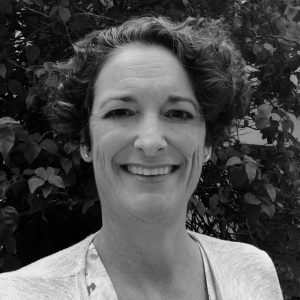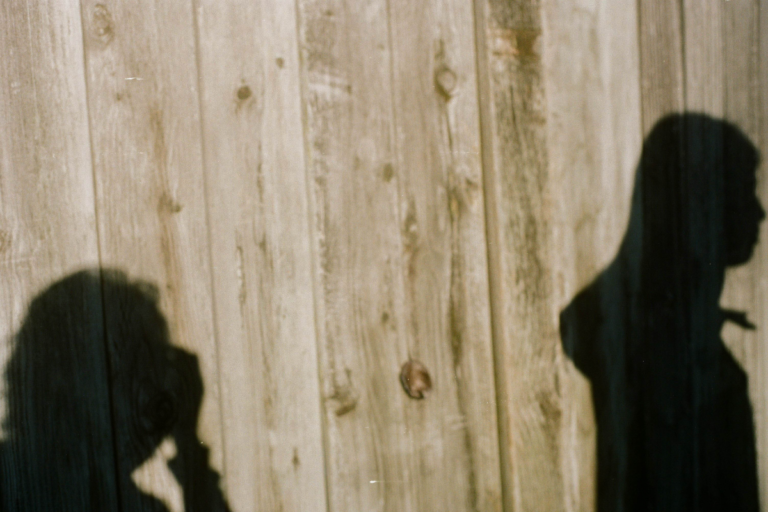Maureen Craig
This Strange, Peculiar Family I Call Mine
“Humor establishes new ground for parents and kids to relate on that isn’t just parent-kid.”
For Maureen Craig, humor is central to how she understands and relates to her family. As a parent, a wife, a daughter, and a brand strategy executive, she believes that there’s always something you can make a joke about.

Image by Todd F. Niemand/Flickr, Attribution-NonCommercial.
Guest

Maureen Craig is a brand consultant and the founder of MoStrategy.
Transcript
[music: “Ixtepec” by Café Tacvba]
MAUREEN CRAIG: Humor can kind of catch you, no matter where you are on a spectrum from sucky to awesome, and it can move you up that spectrum. So it can take a situation that’s awful and make it better. It can also take a situation that’s good and make it fantastic. So in that sense, it’s not just a remedial thing that fixes what’s broken. It’s also an amplifier that captures what’s great.
[music: “Ixtepec” by Café Tacvba]
LILY PERCY: I’m Lily Percy, and this is Creating Our Own Lives, COOL for short, the podcast where I ask people to think through how they shape their lives. And hopefully by listening, we learn how to create our own.
This season on COOL, we’re talking about humor as a tool for survival. Humor is a big part of how I communicate with my family. It’s often dark and morbid, sometimes gross and silly, but it gives us the framework to understand and relate to each other. And it’s the same for Maureen Craig. As a parent, a wife, a daughter, and a kick-ass brand strategy executive, Mo believes that there’s always something you can make a joke about.
MS. PERCY: So tell me, when you were growing up, who was the person that made you laugh the most?
MS. CRAIG: Oh, my goodness. Okay, well, looking in broad context, I have to say –– and this is a bit of a cheat, but the answer would be my family. I’ve got this large, wild, Irish family. And humor in our family, I think, was just part of how we did what we did. And I would say part of it is that people in my family tend toward eccentricity. So just their being is, in and of itself, funny. And then, also, my mom and my dad both have whip-smart senses of humor.
When I was a kid –– my mom is an avid reader and a professional writer. And she would leave copies of the New Yorker all over the house. And I remember at five and six looking at the cartoons and seeing which ones I could figure out. And it was that central to our lives, I think, as kids. And even watching The Carol Burnett Show as a kid. Those sorts of comedy experiences were really, really fundamental. But rather than a single person, I would just say it’s this strange, peculiar family that I call mine.
MS. PERCY: Did you watch Carol Burnett together, as a family?
MS. CRAIG: Absolutely. And, you know, take an image kind of right out of central casting of mom and dad on the couch, and dad’s got a big bottle of beer, and mom is sitting, and there are four kids on the floor. And it was that, together as a family. It was Carol Burnett, The Bob Newhart Show, and M*A*S*H, and All in the Family as well. And both my parents were Jesuit-educated, which I think gives a person –– just in my own limited experience, it gives a person a really wide and encompassing worldview. And so humor sort of plays into that in ways that are always unexpected. But it was just part of how we did what we did.
We weren’t a sports family. We didn’t go to Dodger games every weekend. We weren’t like that. But we were — it was funny. Not in a competitive sense, but seeing the humor in things was part of how we were. My dad used to say, “I could be shoveling shirt in a 60-mile-an-hour wind and find something about it I liked.” And I really think that’s true. I think that that’s something that he passed on to us.
MS. PERCY: It was so embedded in your family, it sounds like, that it was just — I love that you say it’s not competitive, because there is a sense sometimes, when everyone is funny, that you’re always trying to one-up each other. But it sounds like the dynamic wasn’t like that.
MS. CRAIG: Yeah, not at all. It’s a kind of a classic Irish thing, where storytelling is part of how we were as a family. And so that brings with it embellishments and exaggerations that would turn your hair blue but also a love of those moments in the story that just stop you dead and make you laugh.
My mom, for instance, tells this really funny story. When we were growing up, and I must have been, I don’t know, three or four, and she worked in an advertising agency in Los Angeles, kind of back when advertising was really super cool. And so she went out with some friends after work one night and stayed out and had some drinks and basically came home late. And this was before there were cell phones and whatnot. And so she didn’t want my dad to be upset that she was out late and hadn’t called, and so as she’s driving home down Wilshire Boulevard in the wood-paneled station wagon that we used to drive across the country, she reaches into her purse, rolls down the window, and throws every coin in her purse onto the middle of Wilshire Boulevard as she’s driving home so that she has a legit excuse for why she didn’t call. And so I just picture that moment in my head, those two frames of film of this middle-aged woman driving a station wagon down Wilshire Boulevard at midnight on a Tuesday, throwing quarters onto the sidewalk.
MS. PERCY: [laughing] That’s totally an I Love Lucy moment, I have to say.
MS. CRAIG: It’s an I Love Lucy moment, but that was how we lived. I mean that was just how we lived. Or the time when my mom — we’re home on a Saturday, and my mom gets a call from the PBS station in L.A. that says, “Mrs. Craig, congratulations. You’ve still got the lead bid.” And she says, “Still? Got the lead bid?” And the guy says, “For the London double-decker bus.” [laughs]
And she’s like, what the heck? My dad had seen, on PBS, they were having some kind of an auction. And he bid on a bus, a London double-decker bus. $5,000. And even looking back, something like that could fracture a marriage, because it’s actually –– it’s about how we manage our money, and that’s one of the things that does fracture marriages. But in our case, it just becomes this funny story that we tell when we get together.
MS. PERCY: It’s so interesting, too, that you mention M*A*S*H and All in the Family, two shows that I think about that had, at the heart of them, really hard issues they were dealing with. And yet there was humor at really the center. That was the way they dealt with what was going on. And it’s one of the reasons why I’m so fascinated about how humor is a tool for survival for people. And I think, especially M*A*S*H, I think about how humor was used in that show to cope with death and the Korean War. And I just wonder, how has humor been a tool for survival for you? I mean, as you’ve — in your family and then as you continued to grow up.
MS. CRAIG: It’s been a huge one. And it’s funny, because I was thinking about this in the car coming here: humor can kind of catch you, no matter where you are on a spectrum from sucky to awesome, and it can move you up that spectrum. So it can take a situation that’s awful and make it better. It can also take a situation that’s good and make it fantastic. So in that sense, it’s not just a remedial thing that fixes what’s broken. It’s also an amplifier that captures what’s great.
And so when I just think about it across the spectrum of my life, humor is central to how I parent and how I talk to my kids, finding the humor in things and being able and willing to let your guard down and laugh. Laughing with my kids at my own expense, I think, has been really important, because it helps us build a relationship that I think will last over time.
MS. PERCY: So I’m so fascinated that you mentioned parenting when you were talking about how you use it as a tool. And clearly it was a huge part of your childhood and your family. So what did you bring, consciously, into your parenting with your own four kids?
MS. CRAIG: Oh, boy. We started having our kids — my oldest turned 21 yesterday. Yay! And so we started having our kids before the phrase “helicopter parent” had been coined but when it was setting its ugly roots into society. And so at a time when kids went from playing to play-dates, that was right about when we had our first, and when all toys became sort of structured and educational. And our approach, my husband and I, as parents, was more along the model of free-range chickens, of just kind of letting the kids be. And yeah, we sent them to camp, and we wanted to teach them all an instrument and a foreign language and all those wonderful things. We’re not anti-education parents by any stretch. I don’t mean to paint it that way. But we consciously tried to not overly cloister our kids.
And so one of the first ways that we started to sort of find our parenting style was by embracing the “bad mom” and “bad dad” kind of motif and having fun with it, where he might call home from work –– and at that time, I was working from home –– and he’d say, “What are you doing?” And I’d say, “Oh, I’m spending the next 30 minutes ignoring the kids.” And he would just say, “Okay, let me know if anybody’s bleeding.” And it was just part of our sort of repartee.
MS. PERCY: And they would hear that, so they were part of it.
MS. CRAIG: They would hear that, absolutely. And there’s something nice about how humor, even with a four- or five-year-old, they’ll pick up on the nuances, and they pick up on when you’re treating them in the same way you would treat a peer. And so I think in that sense it’s kind of useful, because it establishes new ground for parents and kids to relate on that isn’t just parent-kid.
And I think –– I try to avoid overt sarcasm, because I find it’s laced with meanness that isn’t what I want the culture of my home to be like. I don’t want snappy or hard-edged rejoinders being slung back and forth between us, either among my kids or between us and the kids. So I consciously try to avoid sarcasm. In this electoral cycle it’s been a real challenge.
MS. PERCY: Yeah, no kidding.
MS. CRAIG: [laughs] But we work at that.
MS. PERCY: So I’m curious that –– this is a two-parter for you. Prepare yourself. So how would you say, and I think you’ve been talking about this all along, but how would you say that humor’s formed you as a person, as a human being? And then: what about it are you most grateful for?
MS. CRAIG: Oh, that’s a good two-parter. All right. How has it formed me? I think the impact it’s had on me –– and I don’t mean to sound like I think I’m a fully formed person, because I don’t. My Play-Doh hasn’t gotten dried and crackly around the edges yet. I’m on a journey. But I think the way it’s formed me, at its essence, has made me listen and notice others –– with the desire for intimacy, I think, to really want to notice and see and experience what makes another person tick and what makes them, them. Because when I think about the humor that is funniest and the humor that does the most for me as a person, it’s humor that always turns on, or in some way pivots on, an insight that is deeply true, not just superficially true. And so I think humor attunes you to look for that, to people-watch, to notice gestures, to pay close attention.
And then I think the thing that I am most grateful for is that by hook or by crook, I seem to have surrounded myself with people where my use of humor is valued, and it’s an easy give-and-take and a part of how I relate to the people who are closest to me. And so I feel like –– that part of me, I am so grateful that other people around me have helped let it flourish, that they’ve seen value in it and, for instance, early on, thanked me for it. That really matters.
And then just I would say the other thing I’m grateful for is that it really does help keep your sanity.
MS. PERCY: Yes. [laughs]
MS. CRAIG: On a simple, very transactional level, it just really… Like I’ll play this stupid game with myself, and I know it’s stupid. There are things we do that we know are just absurd. But if I’m in a really bad situation, for whatever reason –– I travel a lot internationally, and sometimes you’re there at the airport, your flight’s been canceled, you’re going to miss your meeting, the next three flights are booked, you don’t have a hotel, and you can’t find one. This all happened to me, interestingly, at Newark airport. I would have preferred it happening in Mumbai, because it’s actually more organized. But regardless, there I am at Newark airport, and I’m standing in line for a cab. The line is, I kid you not, 400 yards long. And so it’s angry Newark people standing in line at night. There are no cabs, there are no Ubers. The line, I’ve spent two hours now in the line. And I say to myself, “Well, let’s count our blessings. What are the good things?” And I’m like, “Okay, I’m wearing comfortable shoes. That’s good news. I’m not too cold, I’m not too hot. That’s good news. My cell phone battery is fine, so I can play Bejeweled, also good news.” And then it starts to rain.
[laughter]
MS. PERCY: Oh, no.
MS. CRAIG: And it’s like, “Well, shoot.” And so then you get to see this kind of Shakespearean drama play out as all these people just go bonkers. I mean they just go crazy, because their patience is stretched, and they’re miserable, and they’re angry. And now they’re getting wet. And Newark rain is not a pretty rain; it’s not a London rain. You know it’s going to make your hair fall out and give you cancer. And so you’re standing there in Newark, and it’s starting to rain, and I’m just like, well, at least things just got more entertaining. Now I can look at people around me coming unglued.
And then I wound up forming this little kind of cadre of three people, and we were all kind of in line together, standing there –– you look like a doofus when you’re holding your briefcase over your head like that’s going to make a difference, and as the rain picks up, we just start laughing. There was nothing else you could do. So on that very basic level, humor is that coping mechanism that even when you get to the end of your list of things that are good, and when you bottom out on that list and there’s nothing else, there’s always something you can make a joke about. There always is.
[music: “All Aboard the Soul Funky Train” by The J.B.’s]
MS. PERCY: Maureen Craig is a brand consultant and the founder of MoStrategy. I first met Mo when she did audience research for the other show that I work for, On Being, and I knew that I liked her the moment she used a photo of Meryl Streep to illustrate an important point.
Creating Our Own Lives is produced by Maia Tarrell, Chris Heagle, and Trent Gilliss and is an On Being Studios production. You can listen and subscribe on iTunes or wherever you download podcasts. And leave us a review on iTunes — it matters more than you think. I’m Lily Percy. Thanks for listening.
[music: “All Aboard the Soul Funky Train” by The J.B.’s]




